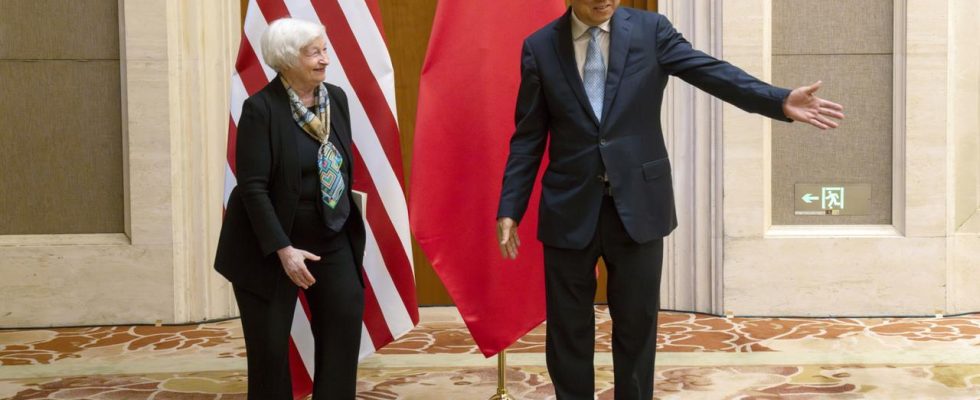Despite the difficult relationship between the two countries, US Treasury Secretary Yellen drew a positive conclusion from her visit to China. China was also cautiously optimistic – and hopes for an end to export restrictions.
US Treasury Secretary Janet Yellen drew a positive conclusion at the end of her trip to China. It was not to be expected that a visit would solve the challenges in relations between China and the United States, she said in Beijing. Nevertheless, she was confident that there would be more regular and constructive exchanges with the Chinese side in the future.
Their conversations over the past four days have been “direct, substantial and productive.” “We were able to learn more about each other’s economies and political decisions, which I think is essential as the two largest economies in the world,” Yellen said.
Expert: “Results of the visit are very modest”
The US Treasury Secretary struck a more conciliatory tone than has often been publicly heard in the current extremely poor relations between the US and China.
Yellen is viewed by the Chinese side as pragmatic and less political than other US politicians, said Andrew Small, China expert at the US think tank German Marshall Fund. “Of course, the fact that we are now talking to each other again has a certain value,” he explained. “But the results of the visit are very modest. It’s actually about resuming important channels of conversation.”
Sanctions continue to be a controversial issue
Cautiously optimistic signals came from the Chinese side: a statement by the state news agency Xinhua said that it had been agreed to strengthen cooperation and coordination.
At the same time, concern was expressed about the “sanctions imposed by the United States on China.” One of the biggest points of contention at the moment between the two largest economies in the world: the government in Washington is trying to prevent China from getting high-performance microchips. One fear is that the People’s Republic could use them for the military.
It is precisely these US concerns that will continue to determine the relationship between China and the US, according to Small of the German Marshall Fund. “At the very beginning of her speech, Yellen mentions that US national security comes first. And the US side tries to make it clear that there is little room for manoeuvre,” he said. “The Chinese, on the other hand, say this is about suppressing China’s development. It’s about a technology blockade.”
China controls against US measures
The communist state and party leadership is angry about the US measures and only a few days ago introduced export controls for two materials that are important for the global semiconductor industry. Starting next month, special licenses will be required to export gallium and germanium. China is the world’s largest producer of these metals.
According to China expert Small, the fact that the state and party leadership chose this step as a countermeasure shows in a certain way how desperate the Chinese government is. Because the export control of raw materials is not sustainable and only hurts other countries briefly – namely until they have created alternatives. At the same time, China is losing an export market and harming itself in the medium term. Many countries, for example in Europe, are now even faster in their “risk minimization” in order to be less dependent on China, said Small.
Yellen also addressed conflict issues
Yellen’s visit to China focused on the economy. Still, the US Treasury Secretary said she raised the issue of human rights in her meetings with Chinese officials. And she asked China not to give Russia any material support for the war in Ukraine.
The close partnership with the aggressor in the Ukraine war, Russia, and China’s human rights violations, including in Xinjiang. These are also two points on which the USA and China are far apart. Here, too, the probability of getting closer is extremely low. Or as Andrew Small from the German Marshall Fund says: It’s like the Cold War, only with close economic ties.

